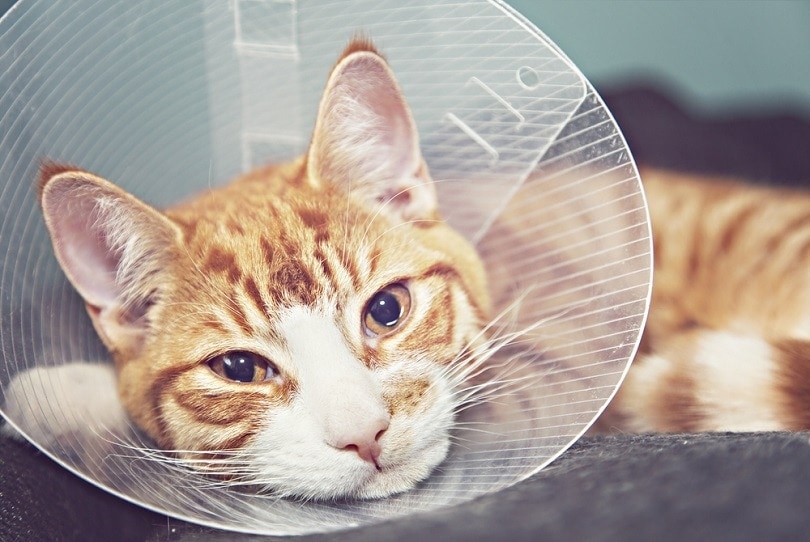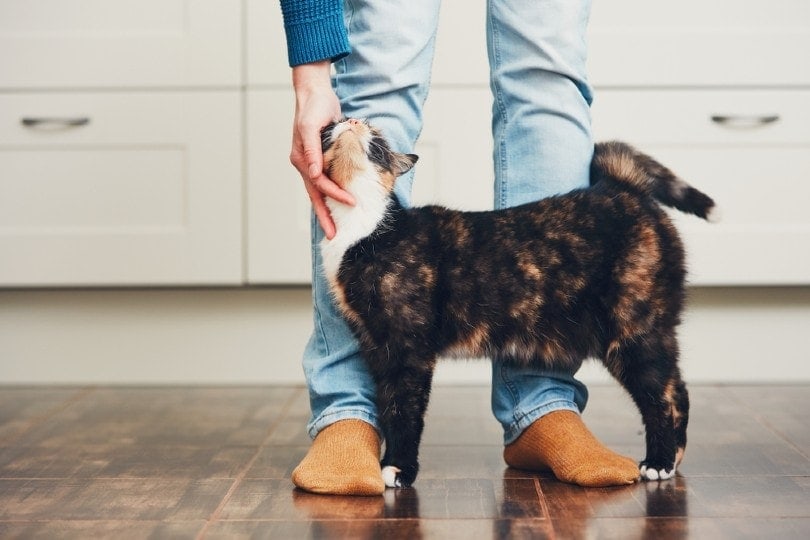Do Outdoor Cats Live Longer Than Indoor Ones? Vet-Approved Factors & Facts

Updated on
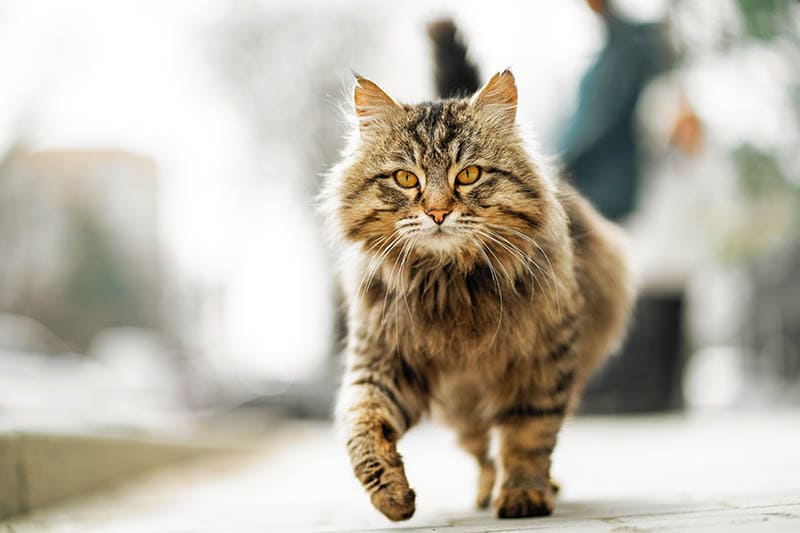
For years, pet owners have debated whether indoor or outdoor cats live longer. Some argue that cats that spend most of their time outdoors have a better quality of life and therefore, live longer. Others claim that indoor cats have a lower risk of injury and disease and therefore tend to live longer. But what does science and research say?
Several factors come into play when determining feline life expectancy, but the answer is clear: In general, you can expect indoor cats to live much longer. According to researchers, indoor cats live on average 10–15 years, while outdoor cats live on average 2–5 years.1 Let’s discuss.
The 2 Factors That Determine Cat Lifespan
1. Lifestyle
One factor is the environment in which the cat lives. Outdoor cats are exposed to more risks than indoor cats. So, naturally, they’re at a higher risk of being hit by a car, attacked by other animals, or contracting diseases from other feral cats. Also, outdoor cats are more likely to be exposed to toxic substances like pesticides and chemicals, which can be fatal. But outdoor cats do have the freedom to roam and explore, which many people think can contribute to their overall mental and physical well-being.
Indoor cats have a more protected environment where they’re sheltered from many of these risks. They’re less likely to be exposed to dangerous situations and to contract diseases from other animals. However, indoor cats that don’t live in an enriched environment may become overweight or develop behavior problems due to a lack of exercise or stimulation.
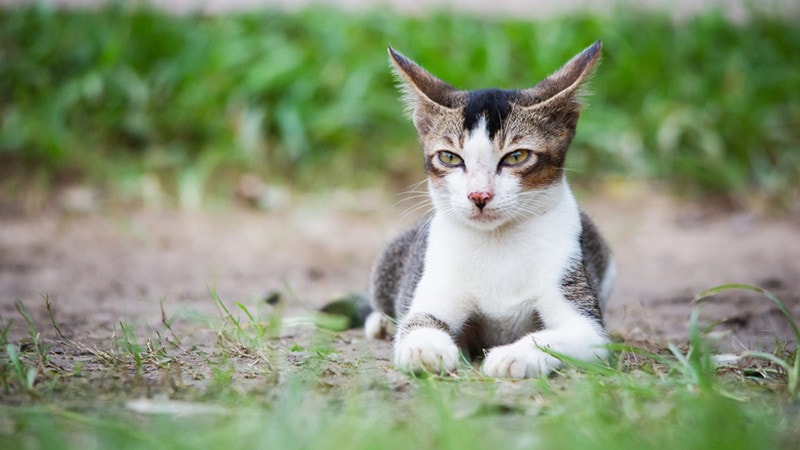
2. Diet & Healthcare
Another factor that can impact a cat’s lifespan is their diet and healthcare. Indoor cats have access to veterinary care and receive treatments and preventative medication, such as anti-parasite treatment and vaccinations. Outdoor cats are exposed to a greater number of diseases that in most instances, can be avoided with preventative medicine. They also must hunt or rely on human caretakers to feed them. Indoor cats usually get complete and balanced diets provided at home. While they can be prone to overeating if they do not receive enough exercise, indoor cats are fed regular meals and are less likely to develop food-related illnesses.
They also have the benefit of having a richer diet and a consistent feeding pattern. Most (if not all) cat foods, particularly the high-quality ones, are made with nutrients and vitamins that help cats stay healthy. Also, indoor cats are commonly taken to the vet to treat any illnesses and disease, which can greatly increase their lifespan.
Indoor cats will live longer than outdoor cats due to having a safer home environment (which means they don’t have to worry about predators), a sustainable and regular source of food, and the protection from outside elements.
Benefits and Risks of Letting Your Cat Go Outdoors
But what about letting your cat simply hang outdoors from time to time? Is that okay? There are both benefits and risks to letting your cat go outdoors. On the one hand, outdoor cats have the opportunity to explore, exercise, and engage in natural behaviors like hunting and climbing. They also get access to fresh air and sunshine, which can be good for their physical and mental health.
On the other hand, outdoor cats are exposed to a number of risks, including traffic accidents, attacks by other animals, exposure to diseases and parasites, and getting lost or stolen. In addition, outdoor cats may cause problems for neighbors by digging in gardens, climbing on cars, or leaving their droppings in unwanted areas. Moreover, there is evidence that cats pose a risk to wildlife due to their hunting instincts.
Before deciding whether to let your cat go outdoors, it’s important to weigh the benefits and risks and make an informed decision based on your cat’s personality (they’re all different), behavior, and lifestyle.
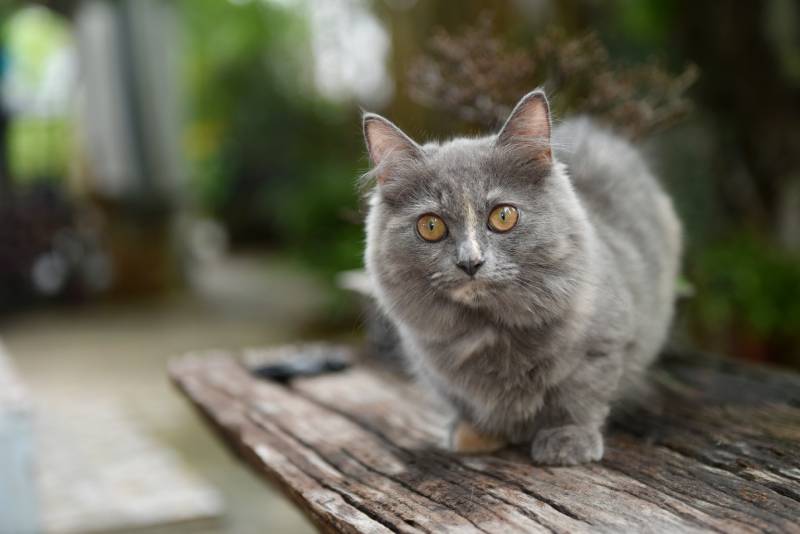
The 5 Ways to Keep Your Outdoor Cat Safe
If you do decide to let your cat go outdoors, there are several steps you can take to keep them safe. These include:
1. Microchipping and Collars
One of the most important things you can do to keep your outdoor cat safe is to microchip them and put a safe collar with identification tags on them. This will help ensure that they can be identified and returned to you if they get lost. You can add a little bell to reduce wildlife predation. But make sure that the collar fits properly and doesn’t pose a strangulation risk by only using one with a safe quick release.
2. Create a Secure Outdoor Space for Your Cat (Catio)
It’s crucial to create a safe and secure outdoor space for your cat to play and explore. This may mean fencing in your yard or setting up a secure outdoor enclosure. Make sure that the space is large enough for your cat to roam and includes plenty of hiding places, climbing structures, and toys. You can check out platforms like YouTube and Pinterest for ideas for setting up these types of climbing structures.
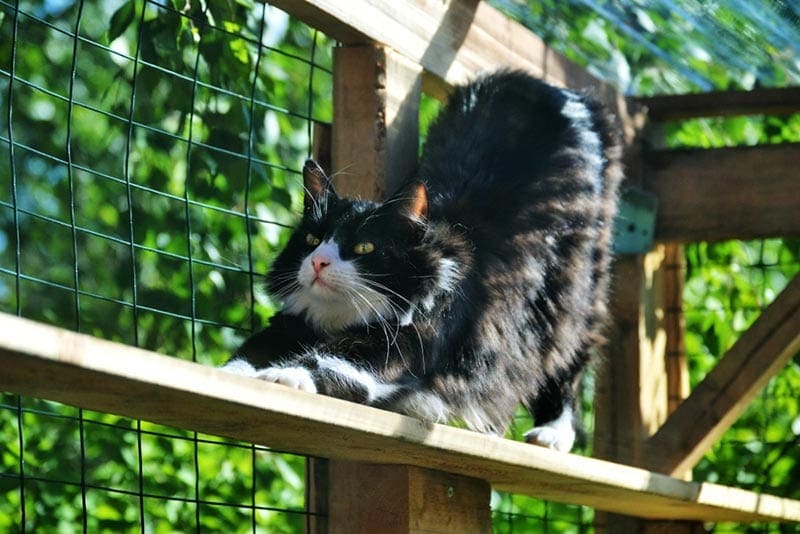
3. Provide Proper Nutrition and Hydration for Outdoor Cats
Outdoor cats may have different nutritional and hydration needs than indoor cats. Make sure that your cat has access to fresh water at all times and that they’re eating a balanced and nutritious diet.
4. Ensure Your Cat Stays Healthy With Regular Vet Check-Ups
Regular veterinary check-ups are vital for all cats, but they’re especially important for outdoor cats. Your vet can help you ensure that your cat is up to date on vaccinations, on flea, tick, and worm prevention, and other preventative care measures. They can also check for any signs of illness or injury.
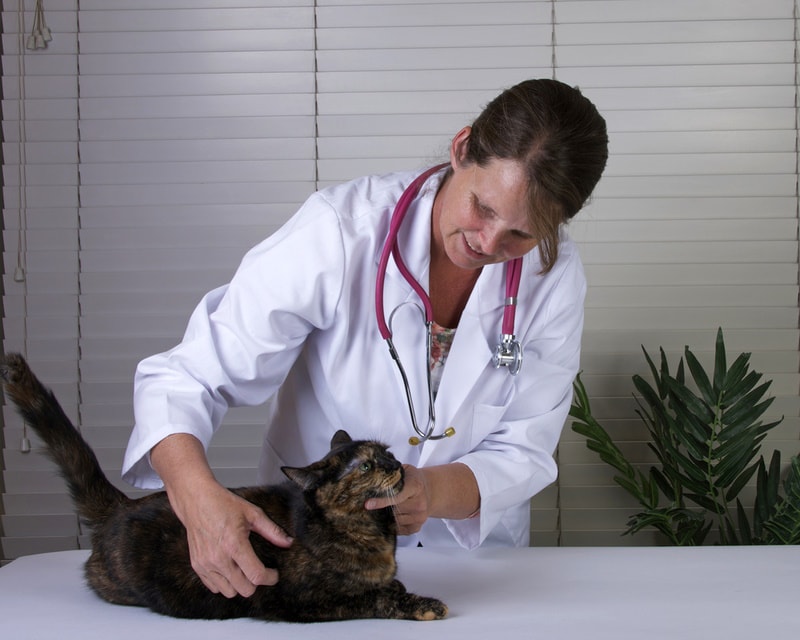
5. Keep Your Cat Entertained With Toys and Activities
Outdoor cats need plenty of stimulation and opportunities to engage in natural behaviors like hunting and climbing. Provide your cat with plenty of toys, scratching posts, and things to climb to keep them entertained and active—they may become bored just roaming the yard.
FAQ About Indoor & Outdoor Cats
Why does my cat always run outdoors?
One reason for this behavior could be their natural instincts to hunt and explore. Cats are predators by nature, and the outdoors provides them with ample opportunities to satisfy their hunting instincts. Also, cats are curious animals that love to explore their surroundings. The outdoors provides them with new sights, sounds, and smells that they cannot experience indoors. However, it is important to note that allowing your cat to roam outdoors can be dangerous, as they may encounter traffic, and other animals, or get lost. So be sure to keep an eye on them or allow them to go outdoors in an enclosed space as mentioned above.
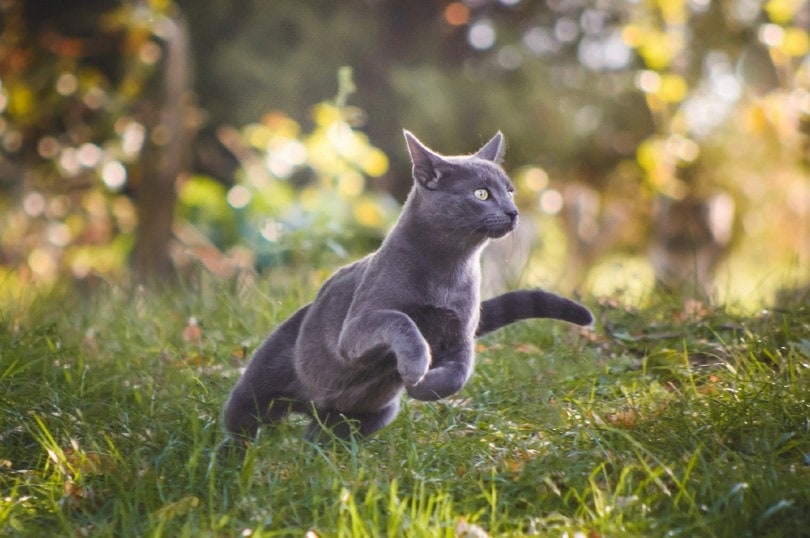
Can outdoor cats get rabies?
They can. Outdoor cats have a higher likelihood of contracting rabies compared to indoor cats. Most outdoor cats are not vaccinated and are more likely to come into contact with wildlife that may be infected with the virus. Rabies is a serious viral disease that affects the nervous system of mammals, including cats, and can be transmitted through the saliva of infected animals. So, it’s best for cat owners to vaccinate their pets against rabies, as it can be fatal if contracted. In some world regions, vaccination against rabies is a legal requirement for cats. Signs of rabies in cats include behavior changes like aggression, disorientation, and increased vocalization. If a cat is suspected of having rabies or if you’re bitten by an outdoor cat that you believe has rabies, seek medical care ASAP.
Do outdoor cats carry diseases other than rabies?
Yes, outdoor cats can carry a number of diseases other than rabies. These can be transmitted to humans and other animals. Parasites and diseases that outdoor cats can carry include fleas, ticks, toxoplasmosis, cat scratch fever, and intestinal worms. Toxoplasmosis is caused by a parasite that’s usually found in a cat’s fecal matter and can be transmitted to humans through contact with contaminated soil or litter. Cat scratch fever is caused by bacteria found in a cat’s saliva and can be transmitted through scratches or bites. Intestinal worms, such as tapeworm and roundworms, can be transmitted to humans through contact with contaminated soil or feces. To reduce the risk of disease transmission, it’s important to practice good hygiene and take precautions when handling these cats.
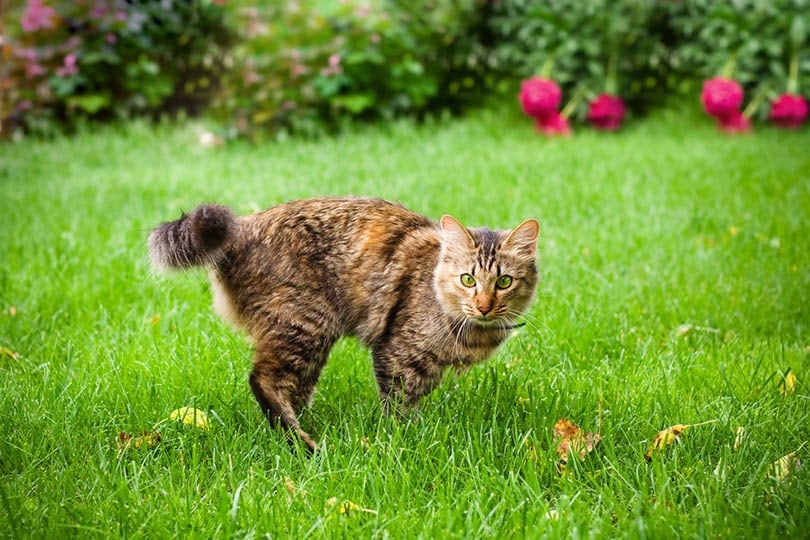
Wrapping Things Up
Outdoor cats can enjoy a variety of benefits, including exercise, exploration, and access to fresh air and sunshine. However, they also face several risks, including traffic accidents, attacks by other animals, and exposure to diseases. This in combination with the fact that indoor cats have regular access to vet care, food, safety, and provisions tends to give a clear answer of whether indoor or outdoor cats live longer, in favor of indoor cats.
Featured Image Credit: Stavklem, Shutterstock



